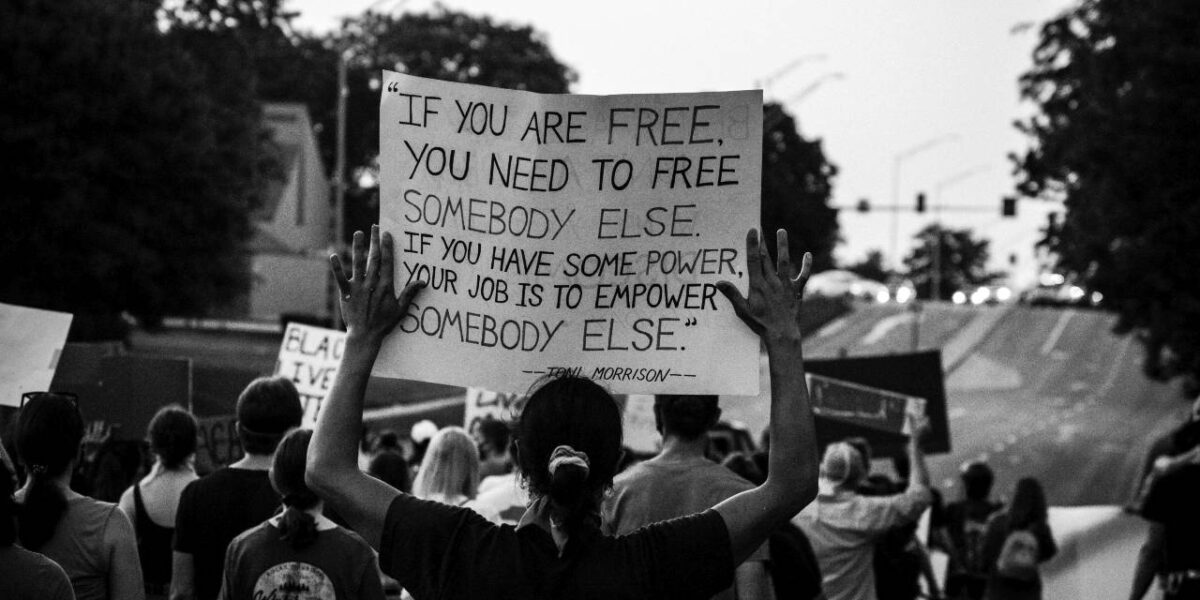How can a bank for wealthy venture capitalists, tech bros and people such as ultraconservative billionaire Peter Thiel be “woke”? Or the U.S. military? What does “woke” even mean?
The word is bandied about by right-wing politicians, media pundits and online commenters to disparage everything from government departments to corporations to educational institutions that implement policies that might appear “progressive.”
When asked to define the term, they often struggle or fail, or come up with meaningless statements like “You know it when you see it.” It’s the new version of “politically correct,” which really just means having good manners. “Woke” has become “a catch-all term for everything they don’t like about modern society,” a Wonkette article says.
It’s not really difficult to define, although its meaning has evolved. It gained traction in 2014, after police in Ferguson, Missouri, shot and killed Michael Brown, an unarmed 18-year-old Black man. “Stay woke” meant to keep watch for police brutality.
According to a Vox article, the term has been used in Black communities for many years. In 1938, blues musician Huddie Ledbetter, known as Lead Belly, wrote the song “Scottsboro Boys” about nine Black teenagers in Scottsboro, Arkansas, who were unjustly accused of raping two white women. In describing the song, he said, “So I advise everybody, be a little careful when they go along through there — best stay woke, keep their eyes open.”
It’s meaning has since broadened to encompass an awareness of and attention to many societal injustices, especially racial issues. Although some argue the broader meaning is cultural and linguistic appropriation, and that the term has been somewhat emptied of meaning, its weaponization by people on the right is arguably worse.
Those involved in social justice and environmental activities have unfortunately become accustomed to the non-arguments and insults that people unable to come up with rational responses employ. Often these take the form of “logical fallacies” — deceptive statements that lack reason.
Two of the most common are ad hominem attacks and what has become known as “whataboutism.” The former, which means “to the person,” is an attack against the character of a person rather than addressing the person’s contention. The latter is an attempt to discredit an argument by deflecting to something the opponent or someone else has done. Neither invalidates the original argument.
Throwing around terms like “woke,” “cancel” or “critical race theory” to elicit emotional reactions rather than spark thoughtful discourse is also widespread, especially in the U.S.
Similar to the fossil fuel industry’s attempts to detract from the damage it causes by sowing doubt and confusion, those who use the term “woke” disparagingly are trying to distract from efforts to rectify systemic injustices that benefit them, especially when it comes to racial injustice. They want society to ignore the harms that work in their favour, whether it’s profiting massively from coal, oil and gas or benefiting from white privilege and systemic racism.
But they don’t want to be obvious. After all, few people will admit that they prefer a system that gives them unfair advantages over others, even if they do allude to being “replaced” by racialized people. And few corporate executives want to admit that their profits and outsized compensation packages come at the expense of human and planetary health and survival.
Terms and arguments like these are increasingly common in a world where discourse gets distilled into a few hundred characters for social media, or brief news clips and articles for busy people with limited attention spans. It can often be difficult to respond without also resorting to shorthand arguments or co-opted terms. And it can be difficult to gain awareness — to wake up to — the real systemic injustices and issues that divide us and slow progress at such a critical time in human history.
But it’s critical to increase our awareness of these issues, to listen to those who suffer from the injustices perpetrated by a system built on colonialism and white supremacy — whether it’s police actions that unfairly target racialized people, hiring practices that favour white people or create barriers for people of colour or polluting industries placed near Indigenous and racialized communities.
We must work for equality, justice and healthy communities. The alarm clock is ringing. It’s time to wake up.
David Suzuki is a scientist, broadcaster, author and co-founder of the David Suzuki Foundation. Written with contributions from David Suzuki Foundation Senior Writer and Editor Ian Hanington. Learn more at davidsuzuki.org.



